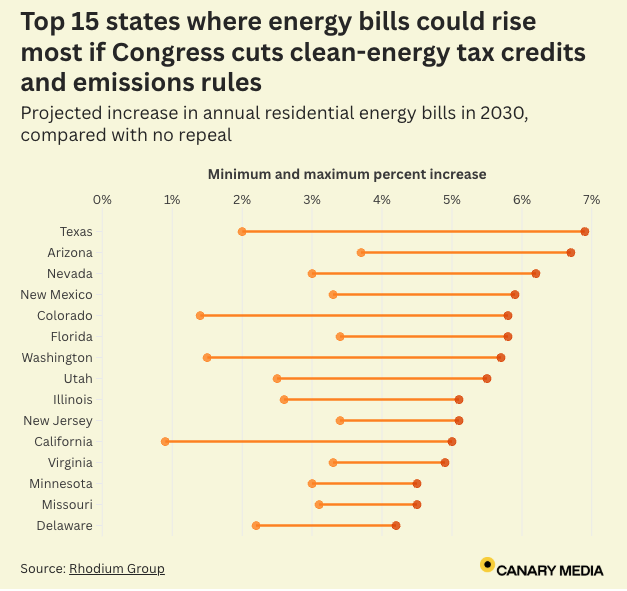
Congressional Republicans are taking aim at the Inflation Reduction Act as they seek to slash federal spending.If they choose to repeal the law’s clean-energy tax credits entirely, it could cause energy bills around the country to rise significantly over the next five years, according to a new report by the Rhodium Group, an independent research organization. A repeal would affect some states more than others, with the deep-red state of Texas projected to get hit the hardest.
Rhodium’s report is not the only one to find that bills would rise with the repeal of key IRA tax credits. Research firm Energy Innovation conducted an analysis of several recent studies on the topic and found that repeal would cost households a total of $6 billion per year by 2030. By 2040, costs would balloon to $25 billion annually.
It’s not just households that would feel the pain. Industrial customers as a whole would spend between $8 billion and $14 billion more for energy each year if Inflation Reduction Act incentives are repealed.
Utility bills are already climbing across much of the country. Service shutoffs are on the rise. The Trump administration just eliminated the entire staff of a program that helps low-income households pay for heating and cooling.
Cutting IRA incentives that encourage the construction of solar, wind, and batteries would exacerbate these problems even as the Trump administration touts its commitment to affordable energy. That’s because clean energy is now the cheapest form of energy, and it’s only getting less expensive. There’s a reason that 93% of the power plants developers plan to build this year are carbon-free.
Congressional Republicans are divided on the issue of IRA tax credits, making it unclear exactly how things will play out. But it’s widely expected that the law will be modified to some extent.
House Speaker Mike Johnson (R-La.) has said the approach will be “somewhere between a scalpel and a sledgehammer.” But attacking the law may be too appealing for GOP lawmakers to pass up; it’s an opportunity to cut federal spending, please Trump, and win culture-war points against clean energy all at once.
Still, there is growing support for the IRA among some of the Republican representatives whose constituents benefit most from the law. We’ll know soon if that’s enough to save key parts of it — and avoid spiking utility bills further.